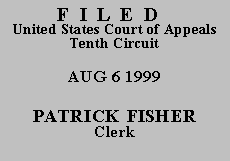
UNITED STATES COURT OF APPEALS
Tenth Circuit
Byron White United States Courthouse
1823 Stout Street
Denver, Colorado 80294
(303) 844-3157
Patrick J. Fisher, Jr. Elisabeth A. Shumaker
Clerk Chief Deputy Clerk
August 16, 1999
TO: ALL RECIPIENTS OF THE ORDER AND JUDGMENT
RE: 98-3254, United States v. Culp
Filed on August 6, 1999
The order and judgment filed in this matter omitted the name of the authoring judge. Senior Circuit Judge Robert H. McWilliams entered the decision for the court.
Please make the correction to your copy of the decision.
Sincerely,
Patrick Fisher, Clerk of Court
By: Keith Nelson
Deputy Clerk

| UNITED STATES,
v.
JAMES CULP |
No. 98-3254 (D.C. No. 97-40005-03) |
On appeal, counsel raises but one issue, contending that Culp's conviction and sentence should be reversed because the government, at trial, called ten witnesses, including co-conspirators with Culp, and that these witnesses had been promised leniency, in one form or another, in exchange for testifying against Culp. Counsel concedes that he raised no objection to the testimony of these co-conspirators in the trial court, but claims that such represents "plain error," which may be raised on appeal even though not raised in the trial court, citing Fed. R. Crim. P. 52(b). See, e.g., United States v. Janusz, 135 F.3d 1319, 1322 (10th Cir. 1998).
Counsel's argument that the so-called "anti-bribery statute," 18 U.S.C. § 201(c)(2), makes it unlawful for a prosecutor to promise leniency to a cooperating witness in exchange for his or her testimony is based on a panel opinion of the court filed on July 1, 1998, but vacated by the active court and rehearing granted en banc on July 10, 1998. United States v. Singleton, 144 F.3d 1343 (10th Cir.1998), vacated and reh'g en banc granted, id. at 1361. The instant trial occurred before Singleton. In his brief, counsel recognized that rehearing en banc had been granted in Singleton but, at that point in time, had not been reheard.
On rehearing en banc, this court on January 8, 1999 held that the anti-bribery statute, 18 U.S.C. § 201(c)(2), did not apply to the United States acting in its sovereign capacity and accordingly did not include the United States Attorney's office, and thus did not prohibit the government offering an accomplice leniency in exchange for truthful testimony. United States v. Singleton, 165 F.3d 1297 (10th Cir.), cert. denied, U.S. , 119 S.Ct. 2371 (1999).
Judgment affirmed.
ENTERED FOR THE COURT,
Robert H. McWilliams
Senior Circuit Judge
*. This order and judgment is not binding precedent, except under the doctrines of law of the case, res judicata, and collateral estoppel. The court generally disfavors the citation of orders and judgments; nevertheless, an order and judgment may be cited under the terms and conditions of 10th Cir. R. 36.3
1.One of Culp's co-defendants, Shawn Battle, was also convicted and he appealed his conviction and sentence. See our No. 98-3246, wherein Battle's conviction and sentence was affirmed this date. The remaining defendant, Richardo Clark, was acquitted.